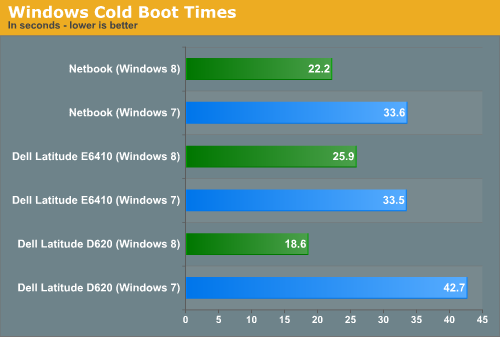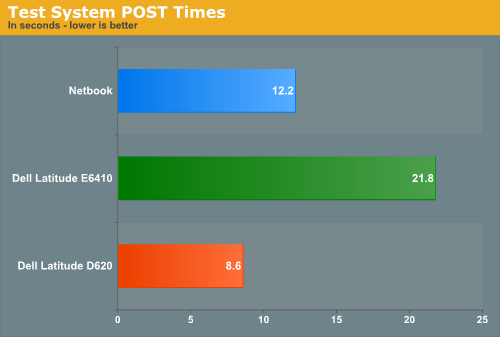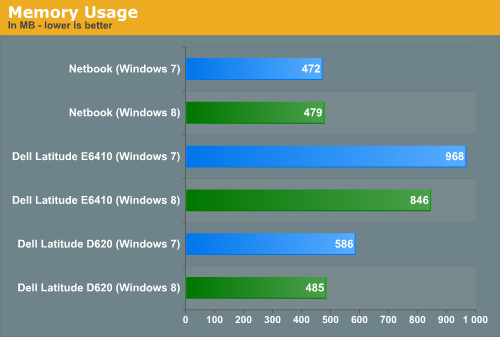In-Depth with the Windows 8 Consumer Preview
by Andrew Cunningham, Ryan Smith, Kristian Vättö & Jarred Walton on March 9, 2012 10:30 AM EST- Posted in
- Microsoft
- Operating Systems
- Windows
- Windows 8
To test claims of faster booting and lower memory usage in Windows 8, I installed a fresh copy of Windows 7 on each of three different computers of varying vintages—a Dell Latitude E6410 with 8GB of RAM and an SSD, a Dell Latitude D620 with 2GB of RAM and an HDD, and a lowly netbook with 1GB of RAM and an HDD. More complete specs for these systems can be found on this page, in which I discuss the computers on which I’ve been running Windows 8. Each computer had the most recent drivers for all of its hardware installed.
Startup time is defined as the amount of time between when the power button is pressed and when the Windows login screen is ready for input. POST time is defined as the amount of time between when the power button is pressed and when the “Starting Windows” boot screen first appears. After measuring all times in Windows 7, I reformatted the hard drives, installed Windows 8 and any needed drivers, and measured boot times in the same way.

Microsoft claimed that Windows 8 featured improved boot times, and that claim is definitely true—boot times vs. Windows 7 are down across the board. These reductions are due to some architectural changes that Microsoft has made—a Windows 7 shutdown would completely purge the OS and all running programs and user sessions from memory and then re-load a fresh copy at next boot. Windows 8 unloads the user session and running programs from memory, but saves the core OS to disk from RAM as it would do if the OS were hibernating. The result is a much faster startup time all around, even on mechanical HDDs. If, for whatever reason, your system doesn’t support hibernation (or if you’ve turned it off), these boot time advantages will evaporate.
But what's that, you say? How is a netbook that barely meets the minimum system requirements booting more quickly than a late-model Dell Latitude? Perhaps these numbers will clear things up:

This is one of the instances where hardware designed for Windows 8 will probably have an advantage over older hardware that has been upgraded—as you can see here, a computer’s time to POST is a larger than ever percentage of total boot time. Thanks to its newer hardware and SSD, the Latitude E6410 only takes four or five seconds (!) to boot to the login screen in Windows 8, but its nearly 22 second POST time means that both the Latitude D620 and the lowly netbook are ready to use more quickly. Systems designed for Windows 8, especially those configured to use UEFI instead of legacy BIOSes, can have drastically shorter POST times, and new computers equipped with SSDs may well go from powered-off to ready-for-input in just a few seconds.
To test claims of reduced memory usage, I took the same machines and let them idle at the desktop with only the Task Manager running. Both the Windows 7 and Windows 8 installs used the same drivers, so any background processes running on one OS were also running on the other OS.

We see marginally lower base memory usage in Windows 8 compared to Windows 7 on the two Dell laptops by a noticeable but not staggering amount. The netbook, with its 1GB of RAM, sees about the same base memory usage under both operating systems—because of the extra caching and preloading that's going on under the hood, my experience has been that Windows 6.x's memory usage increases when you give it more RAM to work with. That computers with 2GB and 8GB of RAM would have a higher base memory usage than a machine with 1GB of RAM shouldn't be surprising.
These slight savings won’t keep you from needing to upgrade your RAM if you’ve been thinking about it, but it’s impressive that Microsoft has been able to hold steady or slightly decrease the amount of RAM used in spite of the additional features (and remember, since Windows 8 includes both anti-virus and anti-spyware protection built in, these numbers should look even better after an install of Microsoft Security Essentials or another anti-virus package on the Windows 7 machines).










286 Comments
View All Comments
jardows2 - Saturday, March 10, 2012 - link
This "new" Metro interface seems quite reminiscant of the Windows 3.1 Program manager. I actually prefer the program manager to the start menu, it seemed better organized and more efficient to me. I'll have to give this a try!Beenthere - Sunday, March 11, 2012 - link
...before I use Win 8.bigboxes - Sunday, March 11, 2012 - link
Ever try uTorrent?androticus - Sunday, March 11, 2012 - link
Please stop aping the Microsoft Marketing Machine (MMM) use of the term du jour, "fluid"--it is annoyingly littered throughout all their Win 8 materials, both promotional and technical. No one ever used this term to describe UI's before this new fetish introduce by MS. Please stop embarrassing yourselves by so slavishly following their lead. Thank you!jabber - Sunday, March 11, 2012 - link
I wouldn't call anything that involves me having to move far left and right across the screen to do stuff 'fluid'.Bloody stupid maybe.
Fluid as in a full fishtank in the back seat of car maybe.
samgab - Sunday, March 11, 2012 - link
I tried Win8CP for a day before I gave up on it and rolled back to Win7.Allow me to attempt to review it in three words:
I hate it.
noname3 - Sunday, March 11, 2012 - link
Nice article, but I disagree with some of the conclusions. Any program that goes full screen on my 30” monitor has to be either a game or a program that has some bugs in it. The whole premise of Windows is that you can control the size of the…Windows. This is a tablet oriented operating system pretending to be useful on the desktop.After >20 years of using and programming in Windows, I am seriously considering switching to a Unix variant. Enough of the Microsoft marketing bs, they have no respect for their legacy and they have completely alienated their strongest user base.
The Windows 8 kernel is a gem, but any benefits are obliterated by the brainless UI. Good luck to them trying to sell this crap. Experienced users will want proper Windows, business are just upgrading to Windows 7, Apple and Android selling like hot cakes, they will only have some dedicated funs upgrading to this abomination, the future looks not very promising for them. This is the worst time to piss off their dedicated followers.
The funniest thing is that they have applied the same brainless UI in the Windows Server 8 too. Using the UI over remote desktop does not activate the corner controls consistently and you end up using the console commands to achieve anything. If this is what I have to do why should I not use a Unix OS? If I have to learn how to use computers from scratch and basically keep searching for everything and memorizing shortcuts, I may as well move to Linux, there is no difference.
I installed Vista since the “beta” days and I found it more functional than XP (maybe I am the only one) but I likes it a lot (even though I found a lot of the controls scattered all over the place). Then Windows 7 came out and it was what Vista should be and so far I think it is the best OS, unfortunately it is the last one too. I am not going to wait until 2015 or 2020 for Microsoft to get their act together, I have a career to maintain.
Microsoft has turned the UI over to a bunch of marketing clowns chasing Apple and Google. I do not like this circus-type company anymore, Sinofsky and Ballmer need to get fired soon and get some serious and creative people at the top, enough we those “me too” mappets.
thebeastie - Sunday, March 11, 2012 - link
I say you will be able to download a dodgey complete release in late July more likely August.But I dont think you will see a Tablet in a store with Windows 8 on it until December, part of my gauge for that is that MS stock price has gone up %25 in the last 3 months and its ALWAYS about the money when it comes to MS releasing important new revenue generating software, sorry to you naive tech heads.
Just match the release dates in the past to their stock chart when its flat to dropping, it fits great, its that simple.
Robo2k - Sunday, March 11, 2012 - link
...and Microsoft tells you: "Your future computer experience: keyboard shortcuts"SERIOUSLY????
I mean they did so many things right with Win 7, now they're talking a huge step backwards in time. With defacto nonexistent multitasking, keyboard shortcuts and a terrible waste of screen real estate.
Never an OS has looked so damn stupid.
Hopefully the many issues will be corrected util it goes gold.
jabber - Sunday, March 11, 2012 - link
I must admit I never ever got into using shortcuts. Should I have done? I started using a mouse when I was 16 when I got a Mac 512k and thought I was supposed to use that for getting around. I found it far more useful than using the keyboard.Today I still only use the keyboard for entering text like I am now. The rest of the time its trackpad or mouse. I don't know any of my customers that use them either.
Now I'm having to learn Windows 8 (well I'm going to have to support my customers aren't I going forward) and having to learn all the keyboard shortcuts.
Just feels like going backwards.
I guess my training/install costs will have to rise as it's going to take more than the usual 5 minutes explaining Libraries and Shutdown in Windows 7 migration.
Plus at the end of the day...who wants to buy a Windows Tablet?